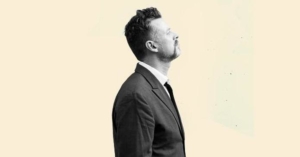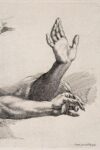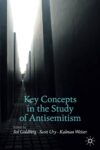
Photo by Beowulf Sheehan
Scott Cheshire talks the way he writes. He jumps out of his seat. He does impressions. He leans in to whisper something to you. He’ll start a rant, but it almost always turns into an homage to a book, or a movie, or a person he loves. It’s incredible, once you get him going, to watch him talk about his childhood, which is to say, about religion: you watch him reliving it, slipping back and forth between the boy Witness he was and the writer he is. In the more intense moments, he sits back quietly, nodding in awe or not-knowing at the unsolvability of it all. Cheshire’s first novel, High As the Horses’ Bridles, insists that we live in that space, here and now and then, unsure, and unable to hurriedly pass judgment on belief — a difficult, also moving, stance to take in a moment where a “vision” can only ever come with scare quotes.
I first sat down to talk with Cheshire over sandwiches in Le Moulin à Café on the Upper East Side, a sort of headquarters for French families from the Lycée down the block. From there, we went to his apartment. On the stairs, which spiral up and open onto an interior courtyard, he told me his building was originally designed for TB patients. (Look at all the air, man, he said.) We talked for a while in his apartment, his pug listening in (there was some serious huffing when Cheshire started talking about angels), and then we walked over to The Book Cellar at Webster Library, where there was a lady up front examining a copy of High As The Horses’ Bridles when we walked in. The second time we talked, we met at Housing Works Bookstore Café. This, Cheshire told me, was where he wrote most of the book. We tried really hard to keep our voices down.
Joshua Cohen: There’s a moment in your novel where the protagonist, Josie, is talking to his ex-wife, Sarah, on the phone and she says to him: “William James, by the way, you should read him if you haven’t. He says if you want to see the significance of a thing, you look at the exaggerations. The perversions of a thing. This is your book.” I’m looking at your copy of James’ The Varieties of Religious Experience in a stack of books over there by your desk. How did that idea — looking at a thing’s perversions — help you to write this book?
Scott Cheshire: In the book, James talks about why we’re looking at these particular instances of Christian intensity, and he refers to a microscope. If you want to understand something, he says, look closer. When you look at a skin cell under a microscope, when you see it closely, you see its grotesqueries, you see it for what it really is, and it’s not what you thought it was, and you come to better understand what it is. In the case of the book, I wanted to write about Christianity, but I didn’t know how to do that — at first, it was pure soapbox. And then at some point, for some reason, I started reading James’ book as writing advice. I realized that to write about Christianity, to write about the religious impulse, I had to get up close and distort it. By putting a first-century-ish prophet in the middle of Richmond Hill, yes, it looks ugly and scary, but it’s dramatically interesting — and you see belief more clearly this way. If you really read James’ book seriously, there’s no way you can’t come away with a healthier understanding of religion.
What’s that — a healthier understanding of religion?
I used to think religion was pure evil. I thought it was the worst we have. Manipulative, total ignorance. Reading James the first time made it less alien. (It’s where I came from, but it’d become alien.) And then the second time I read the book, while writing the novel, it gave me a new way to relate to religion. To myself. It made me get to know my family — my mom, my dad, mostly my dad — better. It made me see how intense that kind of religious impulse is and what it’s capable of. Now I find it relatable — even if it’s also still anathema to me.
Relatable, but also an anathema …
I know, man. I have a problem.
But you’re working through it—
I have no choice. When I think of the books that have formed me as both a reader and a writer — books by Marilynne Robinson, or Walker Percy, or Don DeLillo (who’s religious as hell, but not a believer) — when I first started reading those books, especially Flannery O’Connor, I was trying to make art, but I could not figure out how to do it when all I knew was the worldview I had. I had a self-loathing about the spiritual, or, cultural, place I came from. I hated it. I felt like I couldn’t make art. And so then when I was reading books like Wise Blood, I was overwhelmed, because here I was reading stuff that was beautiful, and disturbing, too, and ultimately moving — and it came from the same toolbox. Up until writing this novel, I’d never written about any of this stuff. I did stories about guys who drank too much, tended bar. More like Larry Brown, or the less religious Denis Johnson. I wrote typical stories about young lost guys. I had no style. I found what style I have now because of my embracing what I have — embracing the toolbox I so wanted to get rid of.
Except for Robinson, who’s a Presbyterian-turned-Congregationalist—
Yeah, but she’s a Catholic Presbyterian-turned-Congregationalist—
—all the writers that you’ve mentioned come from some kind of Catholic background. Are there differences in the ways in which Catholicism infuses their writing and what’s going on with you? It’s a Christian toolbox, but you also never suffered from being made to be a good Catholic boy.
In my experience as a reader, there are not a lot of writers who are Protestant and deal explicitly with religious tradition. The religious writers — or, no, I shouldn’t say that — the writers who are Protestant and creatively work and make fiction that deals with the Protestant tradition, writers like Chris Adrian, Victor LaValle (both of whom are wonderful), or even Jamie Quattro, they approach this. But it’s not explicitly about religion. Protestant writing does not usually embrace direct wrangling with the subject. Whereas with Percy, O’Connor, DeLillo — it’s an explicit wrestling. No, you know — I was drawn to the Catholics because I was pissed. There’s really something so angry about all those writers, even Percy — The Moviegoer, that’s the book. It’s such a lazy gentlemen’s book and yet at the same time he is pissed off for the entire thing — in a lazy New Orleans kind of way, sure. But he’s pissed.
Here’s a line from the novel. It’s Josie reflecting on his past: “I ran from dad. I ran from his insistence I was special, from his compulsive and overwhelming need to believe, from his very blood, which of course I couldn’t get away from, no matter where I went. In fact, here I was sitting on the steps of his front porch.” That compulsive and overwhelming need to believe that Josie sees in his dad — is it something we inherit? Is it in our blood?
The blood thing is just a scarily, nearly Nazi take on nostalgia. “This is where we come from.” “This is the original love and expression for God.” “It’s in our bloodline.” “You’re just another in the line of god’s great American men.” Josie’s dad says things like that. But how far back could that line really go? Two hundred years? Josie’s dad, men like that, they often talk that way. They don’t give much thought to how coherent it is. You cannot be in this great line of American men who go back to the first century of the Church — it doesn’t go back that far. It just doesn’t. The blood is only two hundred years old, at most. But it’s a way of building nostalgia, a romantic past that sanctifies your history. I want the novel to work against this. In the ending, which is the beginning of the bloodline, a boy gets on stage, and it’s just happenstance. Just luck. Or, bad luck. That’s what starts the line of faith. He’s not feeling It. He’s not profoundly inspired. He’s sick, and delirious, and a kid. Whether it’s someone knocking on your door and delivering a message you’ve apparently been waiting for your whole life, or whether you happen to get on stage driven by a fever and a deep longing for your mom, whatever it is: you hear what you need to hear and you see what you need to see. Part of the process of religion, trust me, is to buff and shine and civilize its origins.
And your novel wants to restore the happenstance and horror?
Take angels. When we talk about angels, we’re talking about ourselves. It’s a way to imagine better humans. It’s also a way to imagine the terrifying awesomeness, really, of divinity. If you look closely, angels are scary as hell. R. Crumb illustrated Genesis five or six years ago, and in the panel where Adam and Eve are ejected from the garden there are two angels situated at the entrance, and they have a spinning sword, and they’re just these horrifying dragons — it’s great. This is so much more what Angels should look like, or, at least, what it would feel like to see one. We’ve domesticated the hell out of them.
The novel, actually, is full of saints. People we’d call “angels.” Josie’s engulfed in them. Where’s the devil?
Yes — coming, man. That’s all I’m writing about now.
You’re pretty adamantly not a believer. But your writing does (and I’m pretty sure you know this) have a religious quality to it. The novel’s structured — I’ll just generally say —- like a prayer. You’ve also got a classically religious explanation for where it came from, which I’ve heard you repeat in a few contexts: it came to you in a dream.
Which is totally true.
I believe you. You yourself, in your Armageddon essay, note that one of the two key features of apocalyptic texts is that they’re dream-texts. What’s going on? How do you understand the religiousness of your writing?
When I was writing this book I found myself writing moments that were — not exactly epiphanic — but religiously revelatory. One after the other, sometimes within two or three sentences. And Revelation, man, that’s the book. The book of my youth. It’s the most important book for the Witnesses. So, what happens if you’re not religious, but religion’s still the lens through which you see the world? This is Josie’s problem: he’s no longer a believer, but he still has the same mental structure. What happens then is, you’re looking, but you won’t find It. You’ll seek and find meaning everywhere, which some would read as a beautiful thing. I would claim it’s beautiful only for so long, and is ultimately crippling. I share his problem.
But, so, is writing a religious practice for you?
Yes, and no. I’ll say this. The one thing I know about writing is, if you have a problem, you don’t try to solve it; you incorporate it. So, for example, when I write what I’m just naturally inclined to do is to fixate on a particular image that I for whatever reason cannot stop thinking about. It becomes my totem. I spend all my time trying to figure out what that image is, or implies, and how to dramatically get myself there. To it, the image. And the more I chase after it the more I feel like I’m onto something, like I’m about to see the Thing beyond the Thing. It’s like belief, I think. So, the image of the luck jar that appears there at the end of the novel — it came from just one line in this book by Jon Butler. I read it and it was like, Whoa. Lightning. When I found that, I couldn’t stop thinking about it. I read for months without writing a word. All of it intensely focused on that image. It became godlike. A temporary God. But when I was done writing, I dropped it.
How do you know when you’re done?
I don’t.
You have one on your shelf over there, a luck jar. It’s kitschy. But in the novel it’s functioning in all of its import and realness. It’s like you’re inhabiting people who really actually believe in that thing, even though you the writer just have this cute, kitschy version on your shelf.
And what I never know is: Am I doing something and succeeding? Or am just I failing at being religious?
Does temporary belief make you believe a little?
There’s a line somewhere in the book — it’s right after Josie takes his dad home — about our being nothing but fallen manna for angels. Honestly, having thought of that made me think of everything I know about our relationship to the universe. It’s language, yes, but there’s something about it, coming to that moment, about thinking of us as nothing more than food for God — it kind of scared me. Do I really believe that? No. But it widened my relationship to the universe. It made me reconsider what I am. But I know it’s only language.
Earlier on you said that DeLillo—
God—
—was religious, but not a believer. What does that mean?
Yeah. So, DeLillo, especially in the middle of his career, he writes these books which are all about leading you to a transitional place, a place where you’re just about to get a glimpse of some new truth, to get somewhere beyond — but he only takes you so far. Right to the edge, but then that’s it. The books are filled with this sort of longing, this constant approaching of that thing. He won’t let you see It. It happens in almost every book. And he has his characters going through the same thing as his reader: they have a sort of religious experience where they get right up to a moment that’s pre-transcendental, but they can’t get beyond it. Or, he won’t let them. I think DeLillo really wants it, the Thing, to be there. But he doesn’t believe it’s there. But he wants it to be there. He’s tremendously lapsed. The point is, there’s always something missing and it’s up to you to provide that thing. And to me that’s a middle finger — a helpful one — to a kind of literalist impulse to have it all. It turns your attention back to the world. One of my favorite Amazon reviews of the novel so far goes: “This is a mystifying book. Whatever meaning was in it stayed hidden.”
A book of revelation without revelation.
I hope so! That’s why in “The Angel Esmeralda,” for example, DeLillo has to bring along the train at the end, were it turns out that the passing lights create a visual effect that people take for a vision of Esmeralda. He takes you there, and then he takes it away from you.
This is one of Josie’s main struggles, too. The question of whether his vision was real or not. At one point, as an adult, exiled, he puts the word vision in scare quotes —
And only two chapters earlier he says, “When I was a 12 year-old I had a vision,” no quotes.
Does it matter to you whether the visions in your novel are real?
I want the reader to go either way. And I want it ultimately not to matter. If it matters, then what you have is either a book of crazy people (which is not very interesting) or someone who has no respect for what his father’s doing or going through (which is not very interesting). Or what he went through. I’m not worried about whether the visions happen in correspondence with an actual divine manifestation. What I’m worried about comes from [William] James: if it’s real for them, it’s real.
You made up a religion for your novel. Why?
When I first started writing about the Witnesses, it read like me finally saying all the things I ever wanted to say to the Witnesses — it was vengeful. Inhumane. Violent. It was too close. I made up a church for myself in order to be able to write about my own experience. It gave me distance. The freedom to be more universal. My parents, when they read it, it was clear to them that these couldn’t be Jehovah’s Witnesses. And, anyway, inventing religions is a very American pastime.
Let’s circle back. Sarah, Josie’s ex-wife, is an academic. The novel never says so explicitly, but she is. Specifically, she’s an academic of religion — which is, in part, why Josie’s attracted to her. It’s almost like the methadone to his heroin. I have to ask, what did the academic study of religion do for your writing of this book?
My dalliance with that, with scholarship, is what made me break my relationship with God. It weaned me off the Church. It was like cheating. (And you are made to feel like you’re cheating.) Within the Witnesses, those kinds of books are — “forbidden” doesn’t even really quite cover it.
Go on.
I can even name the book—
The one that did you in?
Yes. Absolutely. It’s called Patriarchs of Time. A while ago I was in a bookstore in Atlanta. And, of course, I’m in the section with the bible commentaries, the apologetics. Baby steps. But then, slowly, I move away from the Judaica and Christianity and Bible sections, and I find Patriarchs of Time. It starts with studies of Janus and turns into this study of the history of the Timekeeper God and eventually ends with an analysis of saturnalia and the origins of Christianity. Now, the great thing was, the Witnesses don’t celebrate Christmas, famously so, and they don’t because of its origins — in saturnalia. It’s a heresy. It’s not Christian, it’s not a bible-based celebration. That very argument from within the Witness tradition itself was like a gateway drug, because it said you could figure out where something comes from and that that will tell you whether or not you should do it. And, so, I’m reading this book and I’m figuring out where I come from. And at first it’s confirming everything I learned as a kid. But then after the saturnalia stuff, it turns to the precursors to God, to the development of the idea of God, or, the representation of God. And the possibility of one true God just starts to die. That did something to me. But it wasn’t about erasing it away. Here — take Butler again. The Luck Jars guy. He shows you how orthodoxy became orthodoxy. But he’s just so in love with the history of American religion, how strange and varied and rich it is. He’s not trying to get rid of religion. On the contrary he’s saying: “It’s so much better than they tell you!” Butler feels like someone who is not a believer, but is saying, “Man, you gotta’ read this stuff, it’s so believable.” The spirit of his stuff — I want to write in that spirit.
Joshua C.A. Cohen is a doctoral student in the Committee on the Study of Religion at Harvard University, as well as an essayist and fiction writer.
This post may contain affiliate links.







